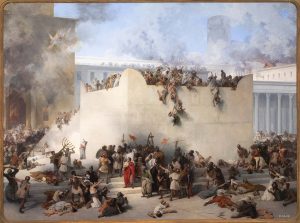
We spend a lot of time talking about Clal Yisrael or Am Israel, the unity of the Jewish people, the fantastic idea that we are all one. However, it’s never seemed to be the case that everyone who claims Jewish identity considers themselves part of this group. We seem to be very easily swayed into looking at denominations and other forms of Jewish practice as false or authentic and often just plain old wrong.
We don’t have a creed; we have something called Halacha. We practice and interpret the law very differently. This is, historically, a source of strength, allowing our tradition to evolve and be organic, but it’s also been the source of a lot of fighting. It creates a very fractious “people.” Indeed, I wonder if Clal Yisrael is a misnomer. However, from the outside, it is a different story.
When others on the outside look, they see Jews. They do not make distinctions between religious Jews, secular Jews, Zionist Jews, orthodox Jews, and the like; to them, it’s just Jews. We’ve seen that mainly through the world’s antisemitism, the Jew-hatred that unites us from the outside.
This brings me to the idea of Sinat Chinam, the concept of “baseless hatred” that we often use as the reason for the internal friction leading to the downfalls of the first and the second temple. It sounds lofty, radical, and extreme. It’s easy for most of us to talk about it as a foreign object and disclaim any connection to it. We believe we are not so strident while at the same time criticizing those who do not practice Judaism as we do. But that is precisely what our sages were talking about when discussing the concept. It’s not some deeply ingrained hatred of another denomination but our inability to accept that your Judaism is as authentic and valid as my Judaism. Your practice is a true expression of your understanding of our faith tradition. As is mine.
So it’s about the annoyance. It’s about the intolerance. It’s about the inflexibility. It’s about the idea that because I am right, you must be wrong. This concept was developed by a teacher and friend, Rabbi Brad Hirshfield, in his book “You Don’t Have to Be Wrong for Me to Be Right.” It’s the idea that we can look at each other with understanding and appreciation, even if it’s not how we practice Judaism.
We must find a way to move past our judgment of each other and our intolerance of what we see when it doesn’t comport with what we believe is our tradition’s “proper” practice. The Jewish tent is broad enough to encompass us all.

